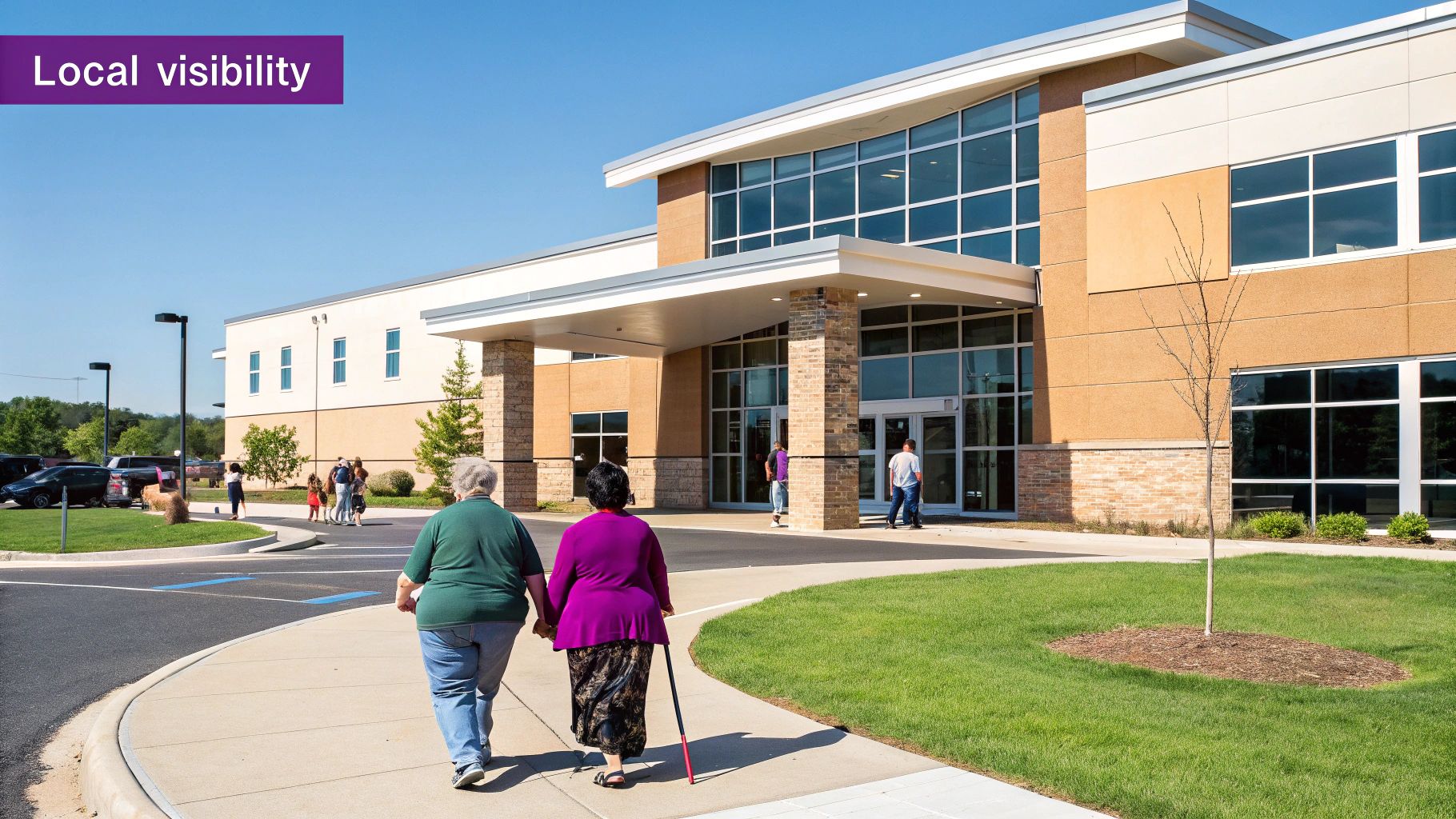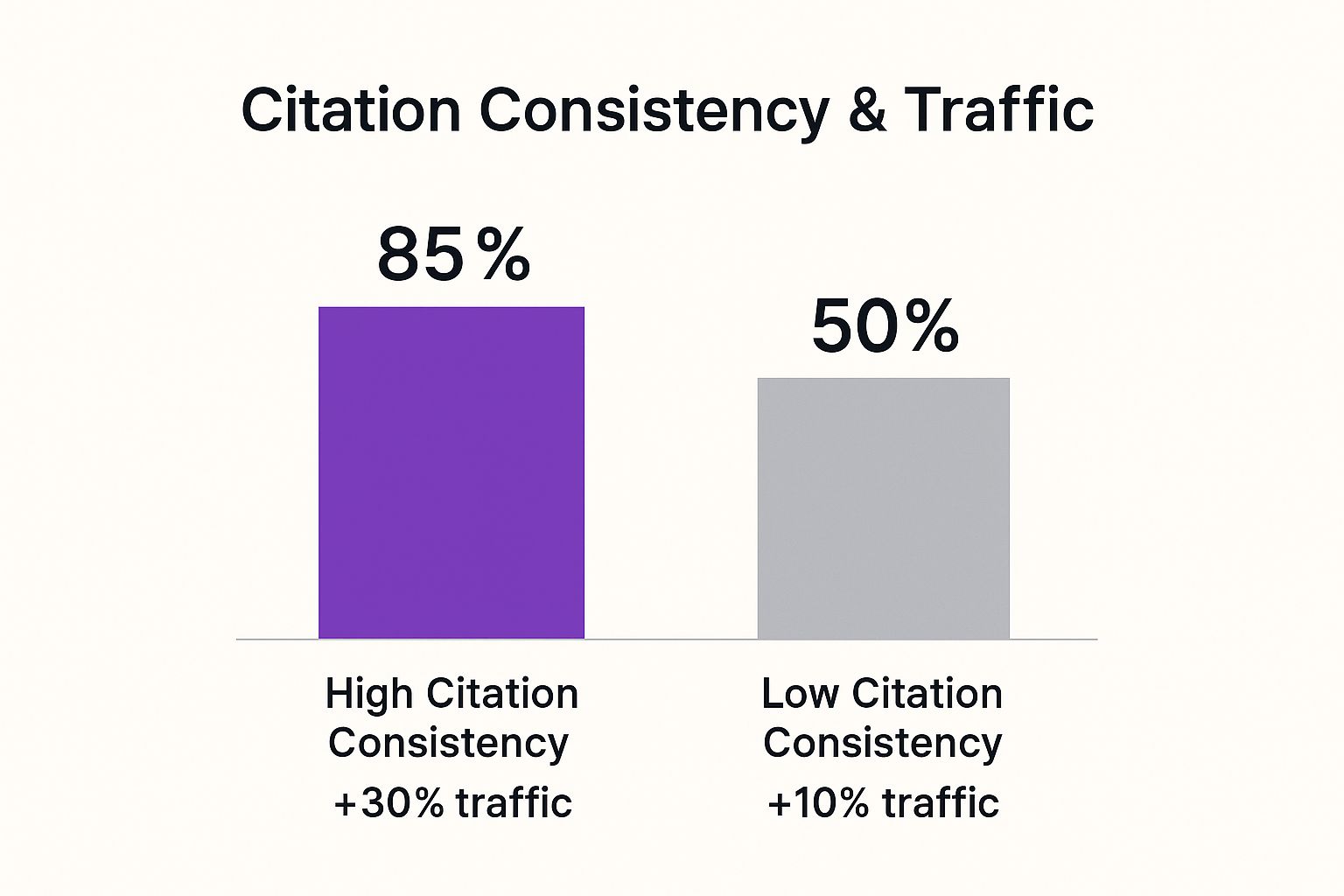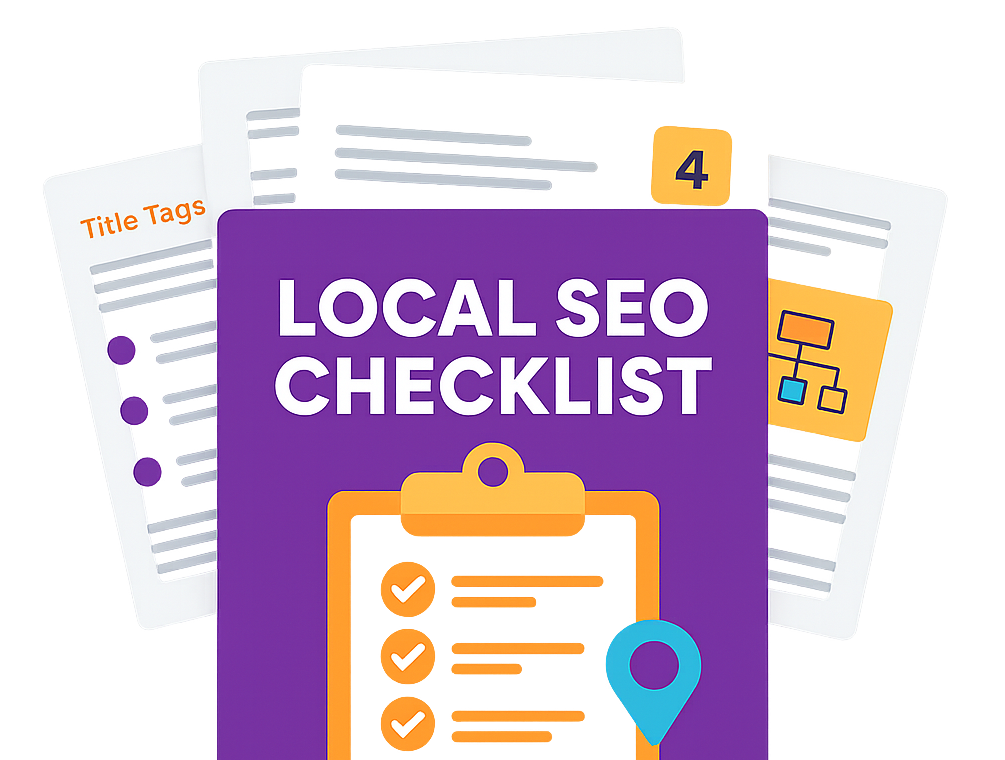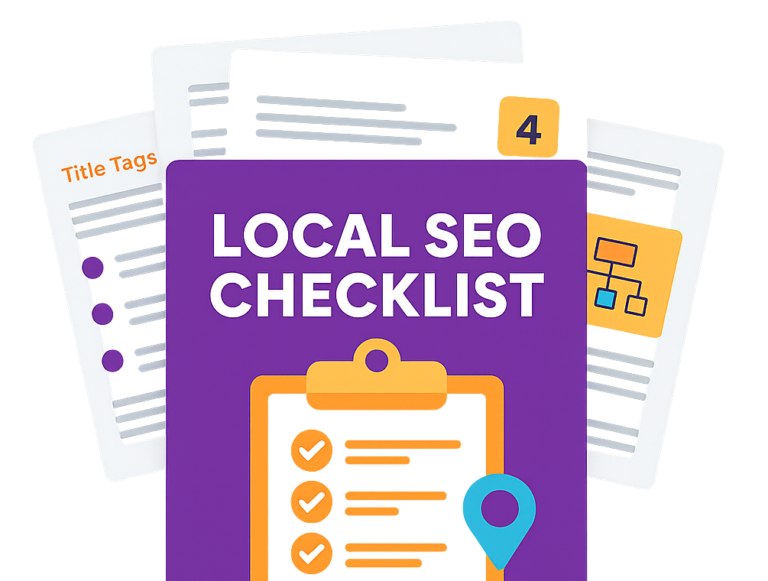Local SEO for healthcare is all about optimising your clinic's online presence to show up when people nearby are searching on Google for the services you offer. It’s a targeted approach that goes far beyond general SEO, focusing squarely on getting you into those crucial local search results, like Google's Map Pack, for queries such as 'dentist near me'.
For any private practice in the UK, this is the single most effective way to connect with patients at the exact moment they need care.
Why Your Practice Needs Local SEO

Let's be honest, the way patients find a new healthcare provider has completely changed. The days of relying on word-of-mouth referrals or a small ad in the local paper are long gone. Today, the patient journey almost always starts online.
Think about it. When someone needs a private GP, a physiotherapist, or an orthodontist, what's the first thing they do? They pull out their phone and type something like 'private GP in Leeds' into Google. These aren't casual browsers; these are high-intent searches from people who are actively looking to book an appointment.
If your practice doesn't appear near the top of these local results, you're essentially invisible to a huge number of potential patients in your area.
Before we dive into the specific strategies, it helps to see how all the pieces fit together. This table outlines the core components we'll be covering, giving you a clear roadmap of what a successful local SEO strategy for your practice looks like.
Core Components of a Successful Healthcare Local SEO Strategy
| Component | Primary Goal | Key Action |
|---|---|---|
| Google Business Profile | Maximise visibility in the Map Pack and local search. | Fully optimise your profile with accurate information, services, photos, and actively manage reviews. |
| On-Page SEO | Signal to Google what you do and where you do it. | Create location-specific service pages and optimise content with local keywords. |
| Local Citations | Build trust and authority through consistent online mentions. | Ensure your Name, Address, and Phone (NAP) details are correct across relevant online directories. |
| Online Reviews | Establish social proof and improve local rankings. | Develop a process for encouraging patient reviews and responding professionally to all feedback. |
| Technical SEO | Ensure your website provides a seamless user experience. | Optimise for mobile devices, improve site speed, and use healthcare-specific schema markup. |
Each of these pillars is crucial for building a strong online presence that not only ranks well but also converts searchers into new patients.
Connecting with Patients in Their Moment of Need
Local search engine optimisation (SEO) isn't just a 'nice-to-have' anymore; it's an absolutely essential part of a modern practice's growth strategy. It’s about being the first, most credible option a potential patient sees when they have an immediate health concern. That visibility translates directly into more phone calls, more online bookings, and more people walking through your clinic doors.
A well-oiled local SEO for healthcare strategy really delivers on three critical fronts:
- Boosts Local Visibility: It ensures your practice shows up in the highly-coveted Google Map Pack for relevant local searches.
- Builds Trust Early: A professional online profile, packed with positive reviews and helpful information, builds credibility before a patient even picks up the phone.
- Drives Qualified Enquiries: It connects you with people in your specific service area who are actively looking for the exact treatments you provide.
Thriving in a Competitive Market
In the UK's private healthcare sector, local SEO has become a game-changer. Patients now rely heavily on Google and online directories to find private doctors, making a top spot in local search results absolutely vital. The market is growing, and competition is stiff. A properly optimised local SEO strategy ensures your practice stands out from the crowd when patients are searching.
This prominence doesn't just increase patient traffic; it builds trust, which is crucial in healthcare. If you're looking for more detail, you can learn more about how private doctors are using local SEO to grow their practices.
By optimising for local search, you're not just marketing your services. You are providing a vital, accessible resource for your community, making it easier for people to find the quality care they need, right when they need it most.
Optimise Your Google Business Profile to Build Trust
Think of your Google Business Profile (GBP) as the digital front door to your practice. When a potential patient searches for a 'clinic near me', your GBP listing is often the very first interaction they have with you. Getting this right is about much more than just claiming your profile; it’s about meticulously crafting a first impression that builds immediate trust and confidence.
A fully optimised profile doesn’t just provide information—it signals to both Google and prospective patients that your practice is active, professional, and genuinely cares about their experience. This is a crucial piece of any local SEO for healthcare strategy because it directly influences how you appear in the highly visible Google Map Pack.
Selecting the Right Healthcare Categories
The very first thing you need to get right is your categories. Google uses these to understand exactly what your practice does, which is fundamental to matching you with relevant patient searches.
Start with your primary category. This needs to be the most accurate, high-level description of your practice. Think 'Doctor', 'Dental Clinic', or 'Physiotherapy Clinic'. Be as specific as you can.
From there, you can add secondary categories to cover the full scope of what you offer. A general medical practice, for example, might add categories like:
- 'Medical Clinic'
- 'Walk-In Clinic'
- 'Travel Vaccination Centre'
This level of detail helps Google understand the nuances of your practice, increasing your chances of showing up for more specialised searches like 'walk-in travel vaccinations in Cambridge'.
Accurately Listing Services and Treatments
Once your categories are sorted, the 'Services' section is where you can really shine. This feature lets you list every single treatment and procedure you offer. Don't be generic here. Instead of just putting 'Dental Services', break it down into 'Teeth Whitening', 'Invisalign Treatment', 'Emergency Dental Care', and 'Root Canal Therapy'.
Every service you add becomes another potential keyword your profile can rank for. For each one, take a moment to write a clear, concise description that explains the treatment and its benefits to the patient. This not only helps your SEO but also gives valuable information to someone who's considering your practice.
An expertly optimised Google Business Profile acts as more than a simple listing; it's a dynamic, trust-building asset. By using all of its features, you transform a basic directory entry into a compelling preview of the quality care you provide.
The benefits of a well-oiled profile link directly to patient acquisition. Local SEO significantly improves your ranking in Google's Local Pack—that prominent box showing the top three local businesses for a search. In the UK, healthcare providers who fine-tune their local SEO see substantial increases in patient enquiries and bookings. With data showing that around 93% of local searches trigger this Local Pack, getting into it provides an exponential visibility boost. Discover more insights about how local SEO can place your healthcare practice on the map at eintelligenceweb.com.
Creating a Human Connection with Photos
Photos are one of the most powerful tools on your GBP for building trust. They offer a transparent look inside your clinic, humanising your practice and making potential patients feel more comfortable before they even book an appointment.
Aim to upload a variety of high-quality images, including:
- Exterior Shots: Clear photos of your building's entrance so patients can easily find you.
- Interior and Reception: A welcoming shot of your waiting area and reception desk.
- Treatment Rooms: Clean and modern photos of your clinical spaces to show your professionalism.
- Team Photos: Friendly, professional headshots of your doctors, nurses, and support staff.
These images bridge the gap between a faceless online listing and a real, caring healthcare team. You can take this even further with our detailed guide on Google Business Profile optimisation, which covers advanced tactics for making your profile stand out.
Using Posts and Q&A to Engage and Inform
Finally, don't let features like Google Posts and the Q&A section gather dust. Actively using them demonstrates that your practice is engaged and helpful.
Use Google Posts to share timely updates, introduce a new member of staff, share a seasonal health tip (like 'Tips for Managing Hay Fever This Spring'), or announce a new service. These posts appear directly on your profile and show that you're current and active.
The Q&A section is your chance to proactively address common patient questions. You can even seed this section yourself by asking and answering frequent queries, such as 'Do you offer weekend appointments?' or 'What is your car parking situation?'. Answering these questions upfront removes barriers for potential patients and shows you understand what they need.
Create a Hyper-Local Content Strategy That Connects

If you really want to stand out with local SEO for healthcare, your website content needs to do more than just list what you do. Generic health articles are a dime a dozen and simply won't cut it anymore. Your goal should be to build a hyper-local content strategy that speaks directly to the needs, worries, and search habits of people in your specific community.
This is all about moving past broad topics. Instead, focus on content that answers local questions and cements your practice as the go-to health authority in your area. When you create content that’s deeply relevant to your town or city, you send powerful signals to search engines about exactly where you are and who you serve.
Develop Location-Specific Service Pages
The bedrock of any solid local content plan is a set of highly targeted service pages. Rather than having a single, catch-all page for "Knee Surgery," you should be creating dedicated pages for each key location you operate in. It's a non-negotiable step for showing Google you’re the most relevant result for a local search.
Here’s what that looks like in practice:
-
Generic Page: "Our Physiotherapy Services"
-
Hyper-Local Page: "Expert Sports Physiotherapy in Birmingham"
-
Generic Page: "Dental Implants"
-
Hyper-Local Page: "Affordable Dental Implants in Manchester City Centre"
Each of these location-specific pages needs to be fully optimised. That means weaving the town or neighbourhood into the page title, headings, and throughout the text in a natural way. The content itself should tackle concerns a local patient might have, maybe even mentioning proximity to local landmarks or transport links to really ground your practice in the area.
This kind of precise targeting dramatically boosts your chances of ranking for those valuable, high-intent searches. A patient in Birmingham is far more likely to find and trust a page specifically about physiotherapy in their city than a generic one with no sense of place. You can find out more about weaving these pages into your broader plan in our detailed guide on content marketing strategies for local SEO.
Uncover What Local Patients Are Searching For
To create content that genuinely lands with your audience, you first have to understand the language they're using. This means getting stuck into keyword research focused on uncovering geo-specific phrases and questions. Tools like Google Keyword Planner or Semrush can help you see what people in your area are actually typing into that search bar.
Your research might turn up phrases like:
- "children's orthodontist near Cambridge"
- "private GP weekend appointments Leeds"
- "hay fever allergy clinic in Bristol"
Once you have this list, you can start weaving these terms naturally into your website copy, blog posts, and service pages. The trick is to always write for people first and search engines second. Your keywords should fit seamlessly into helpful, well-written content that gives the user exactly what they were looking for.
The most effective local content doesn't just mention a location; it embodies it. It addresses local health trends, seasonal concerns, and community events, demonstrating a genuine connection that builds trust and authority.
This approach is only becoming more vital as patient behaviour changes. With UK patients increasingly using their phones to search, "near me" searches have seen explosive growth—rising 500% worldwide in recent years. This trend really drives home the need for healthcare practices to get their local SEO right if they want to stay competitive and connect with patients.
Create Blog Content with a Local Flavour
Your blog is the perfect spot to tackle specific local health trends or seasonal issues, which helps to further establish your status as a local expert. This type of content is incredibly shareable and can attract valuable backlinks from other local websites.
Think about what makes your community unique. Are there well-known local sports teams, big annual events, or specific environmental factors that impact people's health?
Examples of Hyper-Local Blog Topics
- For a London Podiatrist: "5 Foot Care Tips for Surviving the London Marathon"
- For a GP in Cornwall: "How to Manage Hay Fever During Cornwall's Peak Pollen Season"
- For a Dermatologist in Manchester: "Protecting Your Skin from Urban Pollution in Manchester"
This kind of content isn't just great for SEO; it provides real, tangible value to your community. It shows you understand their specific lifestyle and health challenges, which can make your practice the obvious choice when they need care.
Manage Your Online Reputation with Patient Reviews
In healthcare, trust is everything. And these days, online reviews are the new word-of-mouth referral. Think about it: after a potential patient finds your clinic online, their very next step is almost always to see what others have said. This makes actively managing your digital reputation a cornerstone of effective local SEO for healthcare.
A steady flow of recent, positive reviews acts as powerful social proof. It reassures prospective patients they’re making the right choice, but it also sends strong signals to Google that you’re a trusted, active practice. This directly influences where you show up in local search results and the all-important Map Pack.
The goal here isn't to game the system; it's to build a practical, ethical way of managing feedback that turns patient experiences into a real asset for your practice.
Encourage Patients to Share Their Experience
The easiest way to get more reviews is also the most overlooked: just ask. Most satisfied patients are happy to share their positive experiences, but they often need a gentle nudge. Your job is to make it as simple and frictionless as possible for them to do so.
Consider setting up a simple, automated follow-up. A quick text message or an email sent the day after an appointment can work wonders. The message should be friendly and direct—thank them for their visit and provide a single link straight to your Google Business Profile or another key platform like the NHS website.
- Timing is everything: Send the request soon after their appointment, while the positive experience is still fresh in their mind.
- Keep it simple: A direct link to the review page is non-negotiable. Don't make patients hunt for where to leave their feedback.
- Stay compliant: Never, ever offer incentives for reviews. This violates the terms of service for most platforms and, more importantly, it shatters trust. Your request should always be for genuine, honest feedback.
Respond to Every Single Review
Responding to reviews—both good and bad—is non-negotiable. It shows everyone you’re an engaged, professional practice that genuinely values what patients have to say. A thoughtful response can make a great review even better, and it can seriously mitigate the damage of a negative one.
For positive reviews, a simple, personalised thank you goes a long way. Acknowledge their kind words and maybe mention your team's commitment to excellent care.
A professional and empathetic response to a negative review can sometimes turn a bad situation around. More importantly, it demonstrates to everyone else reading that you take concerns seriously and are committed to resolving issues. That's a powerful trust signal.
Negative reviews, of course, need a more careful touch. The key is to respond promptly, professionally, and with empathy, all while strictly adhering to patient confidentiality guidelines. Never confirm that the person was a patient or mention any specifics about their care.
A solid response usually involves three simple steps:
- Thank the person for their feedback.
- Acknowledge their concerns without admitting fault in a public forum.
- Take the conversation offline by providing a direct contact (like a practice manager) for them to discuss the issue privately.
Turn Feedback into a Ranking Factor
Google’s algorithm is smart. It doesn’t just look at your average star rating. It also considers the quantity, frequency (how recent they are), and the quality of your reviews.
A practice with 100 reviews and a 4.8-star rating that gets new feedback every week will almost always outrank a competitor with 20 reviews and a perfect 5-star rating who hasn't had a new review in six months. Fresh, consistent feedback shows Google you're relevant now.
This whole process is a crucial piece of a much larger puzzle. To see how reviews fit into the bigger picture, check out our guide on how online reputation management and SEO work together.
By consistently gathering and responding to patient feedback, you aren't just managing your reputation. You're actively building a more authoritative online presence that both patients and search engines will reward.
Build Authority with Local Citations and Backlinks
What happens off your website is just as important as what’s on it. Search engines like Google look for external signals to figure out how authoritative and relevant your practice is to local patients. This is where two critical pieces of the puzzle come in: local citations and backlinks. Getting these right will give your local SEO for healthcare a serious boost and build a digital footprint that Google trusts.
Think of citations as digital breadcrumbs. A local citation is simply any online mention of your practice's Name, Address, and Phone number (what we call NAP). You’ll find them on business directories like Yell, specialised healthcare portals like the NHS website, and other local business listings.
Each time Google finds your exact NAP details on a reputable site, it’s another vote of confidence. It tells the search engine that your practice is a legitimate, established part of the local community.
The Critical Role of NAP Consistency
Inconsistent information is a major red flag for search engines. An old address on one directory and a slightly different practice name on another creates confusion. This digital mess dilutes your authority and will absolutely hurt your local rankings.
The goal is to get your NAP details 100% identical everywhere they appear. No exceptions.
This means double-checking everything:
- Practice Name: Is it "The High Street Clinic" or "High Street Clinic Ltd"? Pick one and stick to it religiously.
- Address: Make sure every part, from the street name to the postcode, is formatted exactly the same way across the board.
- Phone Number: Use the same local number on every single listing, without any variations.
This kind of meticulous attention to detail is often what separates the practices sitting at the top of local search results from those that are nowhere to be seen.
The data backs this up. Just look at the direct impact consistent citation data has on website traffic for healthcare providers.

As you can see, practices that nail their NAP consistency see a much bigger jump in traffic. It really underscores how vital this is for local visibility. If you need a hand getting this process organised, our ultimate guide to high-authority directory submissions offers a clear roadmap.
To help you prioritise, here’s a quick comparison of the different opportunities available for building your local authority in the UK.
Citation and Backlink Opportunities for UK Healthcare
| Opportunity Type | Example | SEO Impact | Effort Level |
|---|---|---|---|
| Industry-Specific Directories | NHS Service Finder, Doctify | High | Medium |
| General Business Directories | Yell, Thomson Local | Medium | Low |
| Local Community Sponsorships | Sponsoring a local health fair | High | High |
| Local Media Features | An article in a regional paper | Very High | High |
| Partnership Guest Posts | Writing for a local gym's blog | Medium | Medium |
Focusing on a mix of these, starting with the high-impact, low-effort options, is a smart way to build momentum.
Earning High-Quality Local Backlinks
While citations build a foundation of trust, backlinks are powerful votes of confidence from other websites. A backlink is just a link from another site pointing to yours. For local SEO, the most valuable ones come from other relevant and authoritative websites right in your community.
Forget about chasing hundreds of low-quality links. It’s a complete waste of time. Your energy is much better spent earning a handful of genuinely good, relevant links that signal your practice's importance in the local area.
A single backlink from a well-respected local health charity or a feature in your regional newspaper is worth more than a hundred links from irrelevant, spammy directories. Quality and local relevance always trump sheer quantity.
This is where you need to start thinking less like a marketer and more like a community partner. Instead of just asking for links, think about how you can create real relationships that benefit everyone involved.
Here are a few practical ideas to get you started:
- Sponsor a Community Health Event: Get involved with a local 5k run, a school health fair, or a community wellness workshop. Sponsorship almost always comes with a thank-you and a link from the event organiser's website—a trusted local source.
- Partner with Nearby Wellness Businesses: Team up with a local gym, a nutritionist, or a yoga studio. You could offer to write a guest article for their blog on a relevant health topic, and in return, they'll link back to your site. It’s a win-win.
- Get Featured in Local Publications: Reach out to local newspapers, community magazines, or even neighbourhood bloggers. Offer your expert take on a seasonal health issue or share news about a new service at your clinic. A feature story will almost always include a link back to your practice.
By focusing on these authentic, community-driven strategies, you build a backlink profile that not only boosts your search rankings but also cements your practice's reputation as a trusted local healthcare leader.
Common Questions on Local SEO for Healthcare

Jumping into a local SEO for healthcare strategy always brings up a few questions. This final section is all about tackling the common queries we hear from UK healthcare providers. We’ll cut through the jargon and give you the straightforward, practical answers you need to move forward with confidence.
Getting these details right can be the difference between a strategy that connects with patients and one that just doesn't land. Let's dig into some of the most pressing questions.
How Long Does It Take for Local SEO to Work for a Clinic?
This is probably the number one question we get from practice managers, and it’s a fair one. It’s natural to want to see results yesterday, but local SEO is a long-term investment in your practice's growth, not an overnight fix.
Generally, you can expect to see the first meaningful improvements in your local rankings and patient enquiries within three to six months. That said, this timeline isn't set in stone.
Several factors can speed things up or slow them down:
- Local Competition: A dental practice in a crowded London borough is going to have a much tougher climb than a physiotherapy clinic in a quiet town.
- Your Starting Point: If you're building from scratch with no online presence, it will naturally take longer than optimising an existing, well-established website.
- Intensity and Resources: How much time and effort you dedicate to your strategy will directly influence how quickly you see a return.
Some foundational work, like a full optimisation of your Google Business Profile, can start paying off much faster, sometimes in just a few weeks. But building real, lasting authority with high-quality local content and valuable backlinks is a gradual process.
Think of local SEO as building a strong foundation for your practice. The initial work provides stability, while ongoing efforts add layers of strength that deliver sustainable growth, not just a temporary boost.
Is a Blog Really Necessary for My Practice Website?
While a website can technically function without a blog, it's hands-down one of the most powerful tools in your local SEO toolkit. It’s your own platform to connect with the local community, showcase your expertise, and attract patients in a way that static service pages just can’t match.
A blog lets you target very specific, long-tail patient questions. Think about the difference between a generic page on "Physiotherapy Services" and a blog post titled "The Best Exercises for Runners to Prevent Knee Pain in Manchester". The blog post speaks directly to a specific person with a specific problem in a specific location—that’s incredibly valuable for local search.
What’s more, a blog is the perfect place to answer common patient questions before they even pick up the phone. It provides the fresh, relevant, and genuinely helpful content that search engines like Google reward, signalling that your website is an active and authoritative resource in your field. A well-managed blog can dramatically expand the range of keywords you rank for, catching potential patients at every stage of their journey.
Should I Manage Local SEO In-House or Hire an Agency?
This is a big decision, and there’s no single right answer. Whether you should manage SEO in-house or bring in an agency really hinges on your practice's specific resources: your team's time, their expertise, and your budget.
Some basic tasks can absolutely be managed internally. A practice manager or marketing assistant could easily handle things like updating your Google Business Profile hours or sharing occasional news. This hands-on approach can be a cost-effective way to cover the fundamentals.
However, a truly effective local SEO strategy is a complex and multifaceted discipline. It requires technical website optimisation, deep keyword research, consistent content creation, strategic link building, and constant performance analysis. A specialist healthcare marketing agency brings dedicated tools, deep experience, and the focused time needed to execute all of this at a high level.
If you’re short on time or don't have that specific technical knowledge in-house, partnering with a professional agency will almost certainly deliver a much better return on investment. It frees you and your team to focus on what you do best: providing outstanding patient care.
How Does Patient Privacy Affect My Local SEO Strategy?
Patient privacy is the bedrock of healthcare, and it must guide every single marketing decision you make, including your local SEO. Getting this wrong doesn't just damage trust—it can have serious regulatory consequences.
Your local SEO strategy has to be built on a foundation of ethical marketing that puts patient confidentiality first. Always.
This means a few things in practice:
- Responding to Reviews Carefully: When you reply to online reviews, you must never acknowledge that someone is a patient or mention their specific condition or treatment. Keep all your responses general, polite, and professional.
- Getting Explicit Consent: Before you even think about using patient testimonials, case studies, or photos on your website, you need their explicit, written consent. No exceptions.
- Ensuring Website Security: Your website must be secure, using HTTPS encryption to protect any data submitted through contact forms. All data collection must also be fully compliant with GDPR regulations.
Your approach to local SEO should actively show potential patients that you value their privacy just as much as you value their health.
At Bare Digital, we specialise in creating bespoke SEO strategies that help healthcare practices in Cambridgeshire and beyond connect with their local communities. Our team understands the unique challenges and responsibilities of marketing in the healthcare sector.
Ready to improve your online visibility and attract more patients? Get in touch for your free, no-obligation SEO Health Check and discover how we can help your practice grow.








